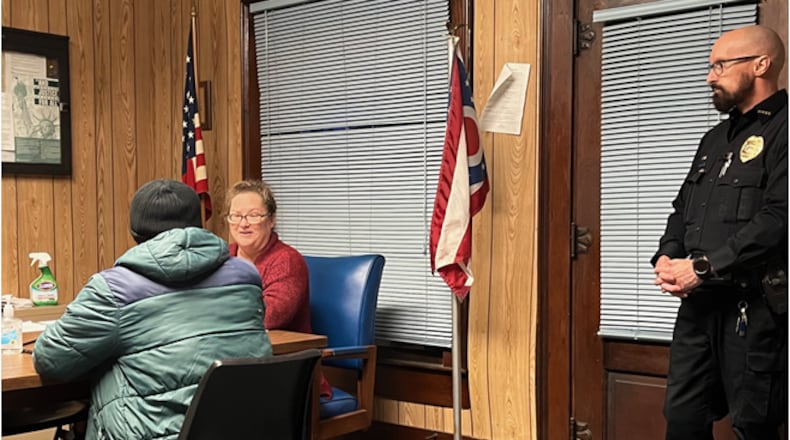Critics say mayor’s courts are often speed traps and ripe for abuse. Court officials say they allow villages respond to local needs. A reporter visited the North Hampton Mayor’s Court to observe how cases are handled.
If you’re not paying attention, a defendant could pass by the farmhouse on Ohio 41 where the North Hampton Village Offices and Mayor’s Court is located and not realize it.
People arrive before the start of court and wait in the parking lot near the rear entrance. A police officer arrives shortly before the session; people have to sign in and the police officer passes a wand around each person before they can go inside.
Only a few people can enter at a time because the house is small as it also houses village offices, court clerk and police. There is a waiting area in what was once a dining room. The court session is held in the front room of the house which has some chairs and a conference table where Magistrate Brandin Marlow presides on the first and third Thursdays of the month.
Marlow, a Montgomery County resident, works as a magistrate in Clark County Juvenile Court and formerly served as a hearing officer for Springfield’s red light camera program. She has been an attorney for 20 years. As she calls each person to the conference table, she reads the offense against them, asks if they understand their rights and takes a plea of not guilty, guilty or no contest.
Marlow then listens to the defendant’s story about the ticket and enters into a conversation. She reviews their driving record and decides on a fine and costs.
“I think it’s important for people coming to court to tell their story because it lends to credibility,” she said. “I try to make people comfortable, which leads to more trust.”
While North Hampton is a busy mayor’s court, many people end up paying the guilty waiver/bond forfeiture of $250 for their traffic infraction. She said she sees more traffic cases than criminal cases and that there are more citations for not having an operator’s license than for speeding.
“My role is not revenue generation,” Marlow said. “My role is problem solving so we’re more safer out there. One of the reasons to have judicial officers is because the law allows discretion and the communities that employ us expect us to use that discretion. The court system needs a personal touch.”
On several cases, Marlow reduced a speeding charge to a non-moving violation such as no headlights, which has a lower fine and avoids points assessed to a driver’s record. One defendant said he had to donate plasma to pay the ticket.
In another case, Marlow accepted a guilty plea to a speeding offense after hearing his story. She reduced the charge to no headlights and the fine to $100 plus costs. She asked if he drives through this area much.
He responded, “not no more.”
In another case, a man from Haiti was in for a ticket. Marlow was skeptical if he understood English well enough to proceed and said his nephew could not translate for him. He said that he wanted to try anyway. After a few minutes, Marlow transferred the case to Springfield Municipal Court, where court-certified interpreters can be obtained, and added the man can pay the ticket online.
Credit: Bill Lackey
Credit: Bill Lackey
Of the 32 cases that were docketed for that session of mayor’s court, 18 defendants were no shows. Marlow said she has a three-strike rule for no shows. After the third time, she places a warrant block on a person’s license which cannot be lifted until they appear in court.
Marlow said she is proud to help working people get their licenses reinstated as three people were in court to show their progress as well as those who are trying to get their fines and costs paid off.
“I’m incredibly grateful for the opportunity to do this,” Marlow said. “It’s a good feeling to contribute to this community and put a personal touch on the court system.”
About the Author





